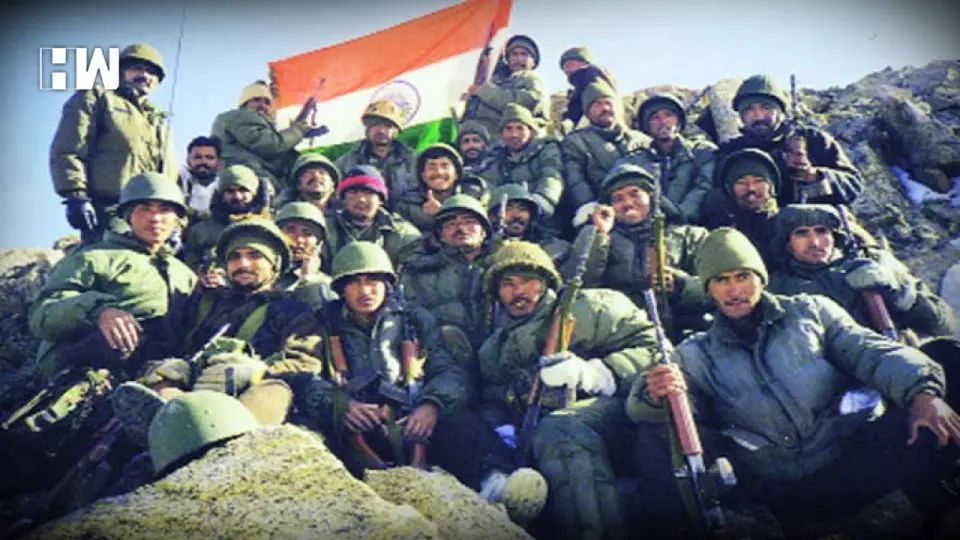July 26. It was on this day 19 years ago that the Indian Army recaptured all the Indian posts in Kargil that had been occupied by Pakistan’s army. Since then, July 26 has been observed annually to commemorate the sacrifices made by soldiers in this war.
Here are some highlights of the Kargil war:
Overview

Photo Courtesy: Web
The Kargil war was fought in 1999 between India and Pakistan in Kargil, Ladakh which was initially Baltistan district, separated by the LOC after the first Kashmir war. The conflict is believed to have been orchestrated by the then Pakistan army chief General Pervez Musharraf without the knowledge of the then Pakistan Prime Minister Nawaz Sharif. Atal Bihari Vajpayee-led NDA government was in power at the time of this war.
Operation ‘Vijay’
It began with the infiltration of both Pakistani troops and terrorists into Indian territory. The infiltrators positioned themselves in key locations that gave them a strategic advantage during the start of the conflict. Based on information from local shepherds, the Indian Army was able to ascertain the points of incursion and launch “Operation Vijay”.
India’s strategic win

Photo Courtesy: Web
India positioned five infantry divisions, five independent brigades and 44 battalions of paramilitary troops in Kashmir. It also deployed as many as 60 frontline aircraft. The Indian Navy launched Operation Talwar to blockade the Karachi port. the Indian Air Force’s operation was a major part of the Kargil war. It used air power at the height of 32,000 feet for the first time. From identifying the Pakistani troops and Mujahideens to interdiction, all the actions were performed well by the pilots and engineers despite just one week of training.
Because the Pakistani soldiers and terrorists had positioned themselves at higher altitudes, it gave them an advantage in combat, as they could fire down at advancing Indian troops. Pakistan shot down two Indian fighter jets while another fighter jet crashed during the operation. Pakistan asked the US to intervene, but then President Bill Clinton declined to do so until Pakistani troops were withdrawn from the Line of Control. As Pakistani troops withdrew, the Indian armed forces attacked the rest of the outposts, managing to get back the last of them by July 26.
India’s restraint
Fundamental to Indian strategy was the difficult decision to limit its response to the Kargil sector and a conscious choice not to cross the LoC and escalate the conflict. At the same time, India mobilised itself for a broader military confrontation with Pakistan and told the international community not to take its self-imposed restraint for granted. India’s demonstration of military restraint won universal approbation, given the widespread international fears that the Indo-Pakistan confrontation in Kargil could become a wider conventional war and move quickly into the much-feared nuclear exchange.
War aftermath
As India witnessed television grabs of its army men in Kargil fighting Pakistan, ‘Operation Vijay’ was termed successful on this day 19 years ago when India won a decisive victory. While PM Atal Bihari Vajpayee declared the operation successful on July 14, the operation was officially declared closed on July 26, 1999.
The victory came at a high price. The official death toll on the Indian side was 527, while that on the Pakistani side was between 357 and 453.
Pakistan initially denied any role in the conflict, saying India was facing off with “Kashmiri freedom fighters.” However, it later awarded its soldiers medals for the conflict, removing any doubt of its involvement.
Kargil Vijay Diwas

Photo Courtesy: Web
Kargil Vijay Diwas was named after the success of Operation Vijay. Built by the Indian army, the Kargil War memorial wall in Dras has inscriptions of all the Indian soldiers who lost their lives in the war. The Memorial also has a museum with documents, recordings and pictures of the Indian soldiers at Kargil.
As an independent media platform, we do not take advertisements from governments and corporate houses. It is you, our readers, who have supported us on our journey to do honest and unbiased journalism. Please contribute, so that we can continue to do the same in future.

